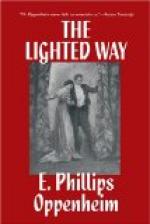“But where to?” she asked.
“Leave it to me,” he laughed. “There are all sorts of surprises for you. The lady with the wand has been busy.”
He carried her downstairs, where, to her surprise, she found a taxicab waiting.
“But, Arnold,” she exclaimed, “how could you think of such extravagance! You know I can walk quite easily a little distance, if I take your arm.”
“I’ll tell you all about it at dinner-time,” he replied.
“Dinner-time?” she cried. “Dinner at this hour?”
“Why not? It’s quite the fashionable hour, I can assure you, and, to tell you the truth, I am half starved.”
She resigned herself with a sigh of content. After all, it was so delightful to drift like this with some one infinitely stronger to take the responsibility for everything. They drove to a large and popular restaurant close at hand, where Arnold ordered the dinner, with frequent corrections from Ruth, who sat with a menu-card in her hand. A band was playing the music of the moment. It was all very commonplace, but to Ruth it was like a living chapter out of her book of dreams. Even there, though, the shadow pursued. She could bear the silence no longer. She dropped her voice a little. The place was crowded and there were people at the next table.
“Before I touch anything, Arnold, tell me this. Is there any news of Isaac?”
“None at all,” he replied. “It all seemed very alarming to us, but it seems to be fizzling out. There is only quite a small paragraph in the evening paper. You can read it, if you like.”
He drew the Evening News from his pocket and passed it to her. The paragraph to which he pointed was headed—
ESCAPE OF AN ANARCHIST FROM ADAM STREET.
Up to the time of going to press, the man Isaac Lalonde, whom the police failed to arrest last night on a charge not at present precisely stated, has not been apprehended. The police are reticent about the matter, but it is believed that the missing man was connected with a dangerous band of anarchists who have lately come to this country.
“Poor Isaac!” she murmured, with a little shiver. “Do you know, I remember him years ago, when he was the kindest-hearted man breathing. He went to Russia to visit some of his mother’s relatives, and when he came back everything was changed. He saw injustice everywhere, and it seemed almost to unbalance his mind. The very sight of the west-end, the crowds coming out of the theatres, the shops in Bond Street, seemed to send him half mad. And it all started, Arnold, with real pity for the poor. It isn’t a personal matter with him at any time.”
Arnold nodded thoughtfully.
“Poor chap!” he remarked. “Just at first I really used to like talking to him. He was so earnest, and so many of his arguments were absolutely sound.”
“It is only lately,” Ruth said, “that he has changed so much.”




